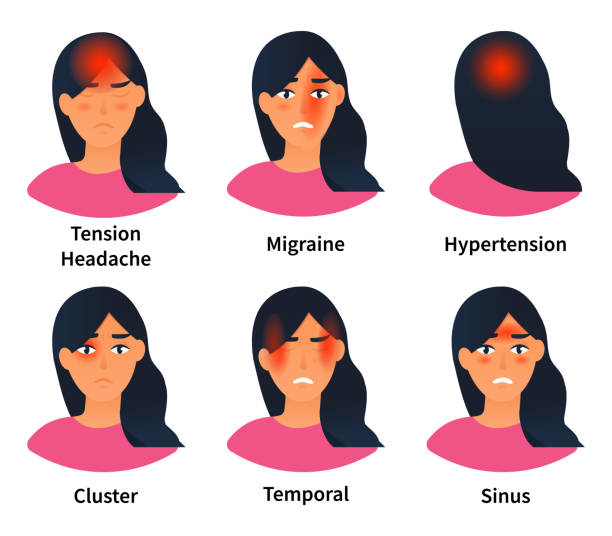Headaches can be a real nuisance, and there are several different types of headaches that can cause varying degrees of pain and discomfort. Knowing the types of headaches and their symptoms, causes, and treatments can help you to identify and manage your headache. Here is a guide to some of the most common types of headaches and their associated symptoms, causes, and treatments.

1. Tension Headache
A tension headache is the most common type of headache, and is characterized by a dull, aching pain on both sides of the head and around the neck. This type of headache is usually caused by stress and tension, and can last for hours or days at a time. Treatments for tension headaches include over-the-counter pain relievers, relaxation techniques such as meditation and yoga, and massage therapy.
2. Migraine Headache
A migraine headache is characterized by a severe, throbbing pain on one side of the head that can last for several hours or even days. Migraines can also be accompanied by other symptoms such as nausea, vomiting, and sensitivity to light and sound. Migraine headaches are usually caused by changes in hormones, stress, certain foods, and environmental factors. Treatments for migraine headaches include medications, relaxation techniques, and lifestyle changes such as avoiding certain triggers.
3. Cluster Headache
A cluster headache is a type of headache that occurs in clusters, with episodes lasting from 15 minutes to 3 hours. This type of headache is usually felt on one side of the head, behind the eye, and is accompanied by a sense of pressure or burning. Cluster headaches are believed to be caused by a malfunction in the body's biological clock, and can be treated with medications, lifestyle changes, and relaxation techniques.
4. Sinus Headache
A sinus headache is usually caused by an infection in the sinuses, which results in pain and pressure around the forehead, cheeks, and eyes. This type of headache is usually accompanied by other symptoms such as a runny nose, fever, and congestion. Treatments for sinus headaches include antibiotics, decongestants, and pain relievers.
No matter what type of headache you are experiencing, it is important to talk to your doctor if the symptoms persist or worsen. Knowing the types of headaches and their symptoms, causes, and treatments can help you to identify and manage your headache.
Treatments for Headaches
Now that you know the different types of headaches, let’s take a look at some of the treatments that can help.
• Over-the-counter medication: Pain relievers such as ibuprofen, acetaminophen, and aspirin can help relieve mild to moderate headaches.
• Prescription medications: Doctors may prescribe stronger medications such as triptans to help with migraines or cluster headaches.
• Home remedies: There are a number of home remedies that can help relieve headaches, such as applying an ice pack to the affected area, drinking plenty of water, and getting enough sleep.
• Mind-body techniques: Relaxation techniques such as yoga, meditation, and deep breathing can help relieve stress and tension, which can be a cause of headaches.
• Acupuncture: Acupuncture is an ancient Chinese practice that is believed to help restore balance to the body, which can help relieve headaches. ( Acupuncture is an ancient Chinese technique used to treat a variety of medical conditions. It involves the insertion of very thin needles into specific sites on the body known as acupuncture points. Acupuncture is used to restore balance in the body, improve the flow of qi (energy) and promote healing. It is believed to help relieve pain, reduce inflammation and improve overall health. )
• Chiropractic care: Chiropractic care may help relieve tension headaches or migraines by helping to realign the spine and reduce stress on the neck and head.
We hope this blog has helped you better understand the different types of headaches and the treatments that can help. If your headaches persist or become more severe, it’s important to talk to your doctor to determine the best course of treatment.












